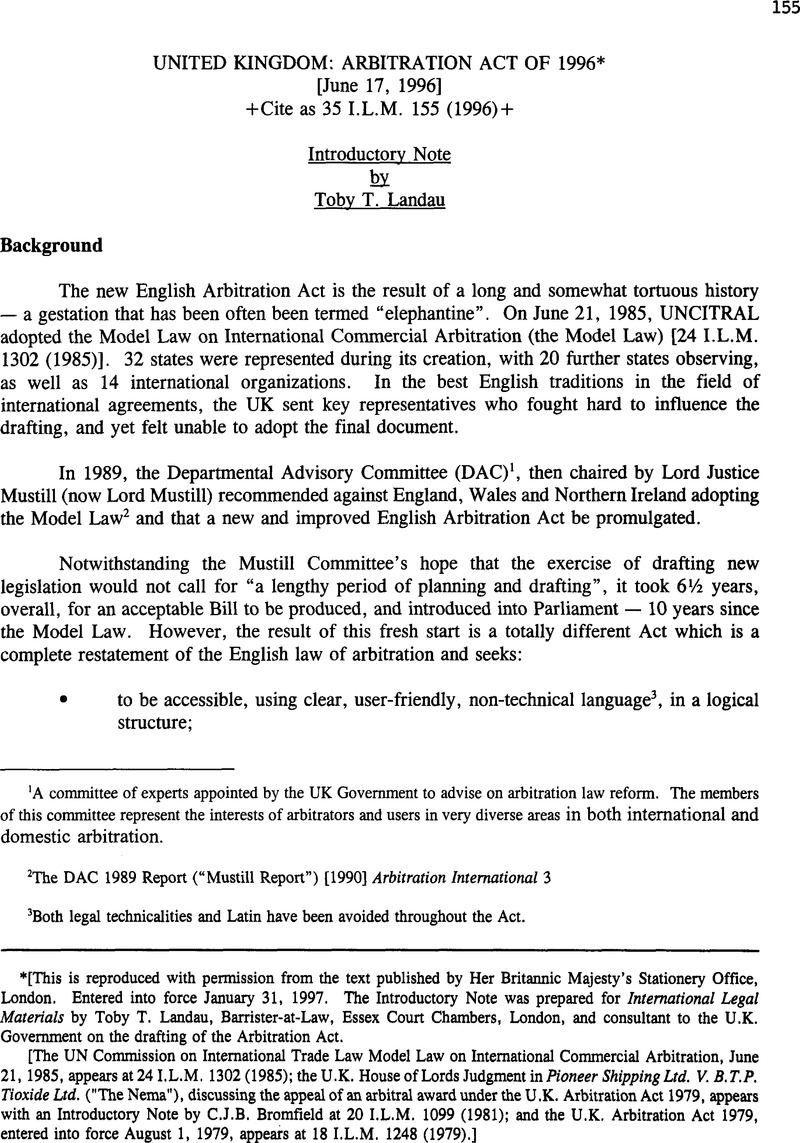Published online by Cambridge University Press: 27 February 2017

* [This is reproduced with permission from the text published by Her Britannic Majesty's Stationery Office, London. Entered into force January 31, 1997. The Introductory Note was prepared for International Legal Materials by Toby T. Landau, Barrister-at-Law, Essex Court Chambers, London, and consultant to the U.K. Government on the drafting of the Arbitration Act.
[The UN Commission on International Trade Law Model Law on International Commercial Arbitration, June 21, 1985, appears at 24 I.L.M. 1302 (1985); the U.K. House of Lords Judgment in Pioneer Shipping Ltd. V. B.T.P. Tioxide Ltd. (“The Nema”), discussing the appeal of an arbitral award under the U.K. Arbitration Act 1979, appears with an Introductory Note by C.J.B. Bromfield at 20 I.L.M. 1099 (1981); and the U.K. Arbitration Act 1979, entered into force August 1, 1979, appears at 18 I.L.M. 1248 (1979).]
1 A committee of experts appointed by the UK Government to advise on arbitration law reform. The members of this committee represent the interests of arbitrators and users in very diverse areas in both international and domestic arbitration.
2 The DAC 1989 Report (“Mustill Report“) [1990] Arbitration International
3 Both legal technicalities and Latin have been avoided throughout the Act.
4 See House of Lords Judgment in Pioneer Shipping Ltd. v. B.T.P. Tioxide Ltd. (“The Nema“) [1982] AC 724, 20 I.L.M. 1099 (1981).
5 In Re Unione Stearinerie Lanza ' Wiener, supra.
6 [1995] 1 AC 38
7 Guidance as to the effect of this Section, and the meaning of substantial injustice in this context, can be found in the DAC Report on the Arbitration Bill published in February 1996, which has been referred to throughout the Parliamentary debates on the Bill, and endorsed as an official commentary, to be used as such by the Courts (See e.g. paragraphs 105-110). The Report, and its Supplement, are an invaluable and authoritative guide to the Act, its transitional provisions and relevant Rules of Court.
8 It should also be noted that by Section 73(l)(b), if a party wishes to make a complaint and challenge an arbitrator, he must do so forthwith, or lose his right to object.
9 A similar provision appears at Article 19 of the Uncitral Model Law; and different provision appears at Article 15 of the Uncitral Arbitration Rules.
10 As with other applications, the tribunal may continue the arbitral proceedings and make an award, notwithstanding that such an application has been made — Section 45(4).
11 The current restrictions, often referred to as the “special categories”, being types of dispute in which appeals could only be excluded after a dispute had arisen, have been removed. In addition, the distinction currently drawn between international and domestic arbitration has been removed, as explained below.
12 Section 1 of the U.K. Arbitration Act 1975.
13 Section 4(1) of the U.K. Arbitration Act 1950.
14 Section 3(6) of the U.K. Arbitration Act 1979.
15 See Philip Alexander Securities and Futures Limited v Bamberger 8 May 1996 (Waller J); 12 July 1996 (affirmed by Court of Appeal) — unreported. This was a decision on the Consumer Arbitration Agreements Act 1988, where a similar distinction is drawn between international and domestic arbitration.
16 This will have one very serious consequence. Where a dispute involves a multiparty situation, with many different contracts but common issues to be determined (e.g. sub-contracts relating to a single construction project; different layers of reinsurance; a contract with a reinsurer and a contract with a broker; different charter-parties; charter-parties and bills of lading; etc.) under current law a party may ask the court (in domestic cases) to exercise a discretion and to refuse to stay its own proceedings in favor of an arbitration, on the basis that there are no common dispute resolution provisions among the multiple contracts, such that if a stay were granted there would be a multiplicity of different arbitrations and/or suits, and a consequent risk of inconsistent results. Under the new Act, this discretion has gone, such that the court will have to stay its own proceedings with respect to any of the multiple contracts that contains a valid arbitration clause. Given that the Act does not provide a mechanism for consolidation of different arbitral proceedings, or concurrent hearings (in the absence of an agreement to this effect — see Section 35), problems will result unless parties themselves provide for this, whether in their arbitration agreements, or by the adoption of institutional rules that include a mechanism to deal with multiparty cases.
17 See e.g. Westdeutsche Landesbank Girozentrale v. Islington LBC [1996] 2 WLR 961